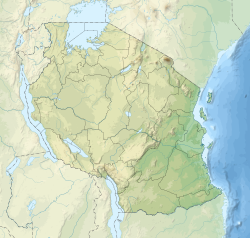| Gaddafi Mosque | |
|---|---|
 | |
| Religion | |
| Affiliation | Islam |
| Branch/tradition | Sunni |
| Location | |
| Location | Dodoma, Tanzania |
| Administration | BAKWATA |
| Geographic coordinates | 6°10′22″S35°44′45″E / 6.172689°S 35.745721°E |
| Architecture | |
| Type | Mosque |
| Funded by | Muammar Gaddafi |
| Date established | 2010 |
| Construction cost | US$5 million |
| Specifications | |
| Capacity | 3,000 worshipers |
| Dome(s) | 2 |
| Minaret(s) | 1 |
Gaddafi Mosque is the largest mosque in Tanzania and the second-largest in East Africa after the Uganda National Mosque in Uganda. It is located in the Tanzanian capital of Dodoma.
The pink structure was named after the former Libyan Brotherly Leader and Guide of the Revolution Muammar Gaddafi who provided the funds for its construction via the World Islamic Call Society. The mosque was inaugurated by President Jakaya Kikwete in 2010 and can accommodate at least 3,000 worshippers. [1]

